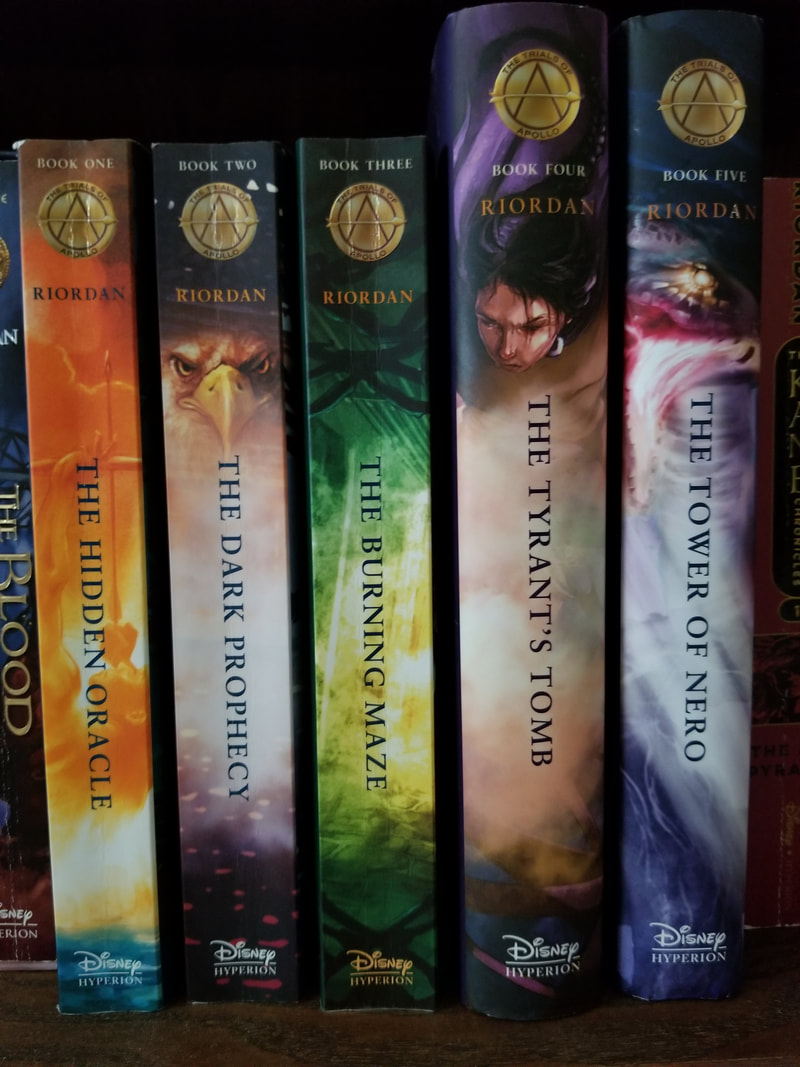|
I’ve long been a Rick Riordan fan, and I’ve done a couple posts already on his works: first on the Percy Jackson series, and then again on the Heroes of Olympus books. This time around, The Trials of Apollo books come after the events of the Heroes of Olympus, and specifically follow the god Apollo as he is banished to earth in the mortal form of Lester Papadopoulos. Apollo finds himself bound in service to the young demigod Meg and must restore the various oracles that have been lost or dominated by dark forces, while at the same time battling an evil triumvirate of former Roman emperors.
Unfortunately, there were several things I didn’t care for about these books, which is unusual, considering how much I’ve enjoyed this author’s previous works. In particular, there were the references to Apollo having lovers of both genders. Such references are accurate to the original Greek myths, but at the same time, it’s kind of awkward to read about relationships that I personally don’t believe are acceptable. Especially when it includes details about a pair of guys feeding each other grapes and staring deeply into each other’s eyes, etc. Another aspect I didn’t care much for was Apollo himself ><. Once a god but now reduced to a mere mortal, Apollo is pretty pathetic. He spends most of the series not being able to accomplish very much. Sadly, today’s culture seems to be filled with the acceptance and promotion of “mediocre heroes.” This is something I simply don’t understand. Heroes aren’t supposed to be mediocre; why write stories about them if they are? It’s one thing to be scared and inexperienced but then come through in the end. But Apollo is scared and inexperienced and mostly just embarrasses himself ><. One benefit to Apollo starting off pathetic and incompetent is that is gives him room to grow. Some of his god-like powers return in random bursts during his quests, but where we really see progress is in his development of a human conscience. As he laments in book 4 (pg. 300), reflecting on actions that he took as a god that didn’t bother him at the time: “‘I’m holding the last breath of a god I bullied… in the jar of a Sibyl I cursed, who was protected by birds I turned into killing machines after they tattled about my cheating girlfriend, who I subsequently had assassinated.’” One of his friends, Reyna, replies, “‘All true… But the thing is, you recognize it now.’” It takes five volumes, but by the end, Apollo does come to understand the value of what it means to be human. Another benefit of Apollo’s weaknesses is that is gives the opportunity for his demigod friends to shine around him. This isn’t too far off from what we see in the Bible: God uses weak characters all the time to showcase His power and strength (such as lepers, prostitutes, tax-collectors; even a teenage nobody to give birth to His Son). And in Rick Riordan’s world of myths and mayhem, there’s nothing like a fallen god to help you see what true power really looks like ;-). Of course, I’m all about the value of being human – even if we’re weak – and seeing God’s power shine through that human weakness. Don’t be surprised to find concepts like that woven into what I write! :-D What do you think? Share your thoughts in the comments section! Until the next time, keep reading! P.S. – If you enjoyed this post, please share it with your friends! Here’s a link: https://www.lynnwallaceauthor.com/blog-on-books-and-writing/the-trials-of-apollo-heroic-or-not-so-much P.P.S. – Don’t forget to follow me on Facebook/ Twitter/ Instagram, and sign up for my email list!
0 Comments
Leave a Reply. |
My Blog:I have two passions: reading and writing. You can't write good stories without first reading good stories - that's my theory, anyway. So this is where I'll share with you the depth of those passions: background on what and why I write, as well as talking about the books that I read and how they impact my writing. Archives
June 2024
|

 RSS Feed
RSS Feed